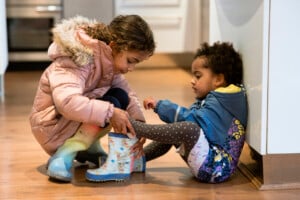In this digital world that we all live in, social media is the first place we want to share our child’s accomplishments or their just overwhelming cuteness. But we need to try to remember to put boundaries on what we post online and what we keep private. With our phones constantly in our hands, adding a photo or video to our feeds is almost second nature to share with family and friends. There is also the thought that we will not lose that video or photo once posted and can replay it forever. And that’s where it gets scary: what you share is a permanent fixture in the wireless universe. Remembering that fact will maybe help us limit or set boundaries on what we choose to share permanently.
As millennial parents, we are the first generation to raise kids online. Our kids are the first generation to grow up with their lives being shared or posted. There isn’t yet a playbook for going about this as a parent or child in the 21st century. However, some things we have learned from poor experiences may help us set healthy boundaries to protect our children and family presently and in the future. There is a fine line between sharing and oversharing when it comes to social media and our children. Knowing where that line falls is half the battle.
Important Considerations When Posting Online
Digital Kidnapping
When sharing something about your child online on any platform, you never will have complete control over who has access to that information. Anything you share online has the potential to be viewed and used by anyone anywhere. There is a new term out there known as digital kidnapping.1 This is when strangers can take your image and use it to act like your child is their own, or worse, they could use it for physical kidnapping.
Digital History Starts Early
Did you know that 92% of 2-year-olds in the United States already have an online presence?2 It can begin with that sonogram photo since that was likely the first post of your child on the internet. Their digital history will date back to that post, years after you shared it. We as parents are starting our children’s digital history, sometimes before they are even born. As parents, we must remember to respect our children and try to share only things that we feel an adolescent would be okay for the world to see.
Share Smarter
There are some things we may share as parents that seem harmless. Some things we think will be fond memories for our children and us to look back on. It is about how smart we are in sharing things that will make a world of difference. Here are some things you shouldn’t post online, no matter how tempting:
Something that may be embarrassing later.
This one is subjective, but consider how your child might feel in the future. A good barometer for this is if you would be comfortable sharing with a room full of strangers, then post away! If that makes you hesitate, it is best to keep it private. Leave the first time using the potty to their first kiss for them to share when they are older.
Pictures of your child not fully clothed.
Images like this could make your child a target for predators. Those bathtub photos, although adorable, are best to be shared privately with family and friends and not on the internet.
Other people’s children.
What you might be okay sharing, other parents may have different boundaries. Believe it or not, posting about other people’s children can be illegal. Some states have recently passed legislation that makes it unlawful to post images of other people’s children without written consent.3
Identifying traits.
Those back-to-school photos are so sweet. But ensure that if a stranger views the image, they can not determine where you live, where your child attends school, and what bus route they take. It may seem drastic, but that kind of information does not need to be shared with the world. It has been shown that posting the simplest thing, like a birthday party with your child’s age, is all an online predator needs to complete an entire “kidnapping” of your child’s world.
Take time to think about the future consequences before you eagerly hit that button. As parents, it is our responsibility to think twice before we post. You also can block someone you feel has ill intentions or continues to follow your accounts, even if you do not know them. Again, knowledge is power, so knowing what it means when you block someone is just as important as actually blocking them.
Teach Your Kids the Dangers of Online Sharing
Using these steps to help make your social media sharing more of a positive and safe environment for your children is just as important as teaching about strangers. Just because we can not see them, people search the web daily for new ways to find children, manipulate situations, and more. Our job as parents is to be as safe as possible, especially in a day and age when everything is so public.
However, the internet and sharing of our families don’t always have to be a bad thing. Most children are learning the boundaries of the internet and keeping their world, thoughts, and photos more private. As parents, we can use this to our advantage by modeling the appropriate behavior with our social media. Guiding children through actions instead of words can significantly impact their behavior.
Weighing the risks and benefits of sharing our children on the web is a decision families need to decide what works best for them and their family dynamic. Maybe sharing with family and friends in more of a private way, like an email chain, printing photos, or creating family albums, is more in your comfort zone. Or maybe you feel like sharing your family and documenting it more publicly is something you are comfortable with and the way of the world these days. You may fall somewhere in the middle of these ideas. However, you choose to post online (or not), remember to be smart, think it through, and remember it will last a lifetime.































